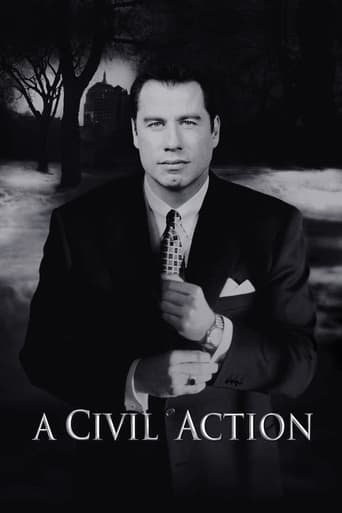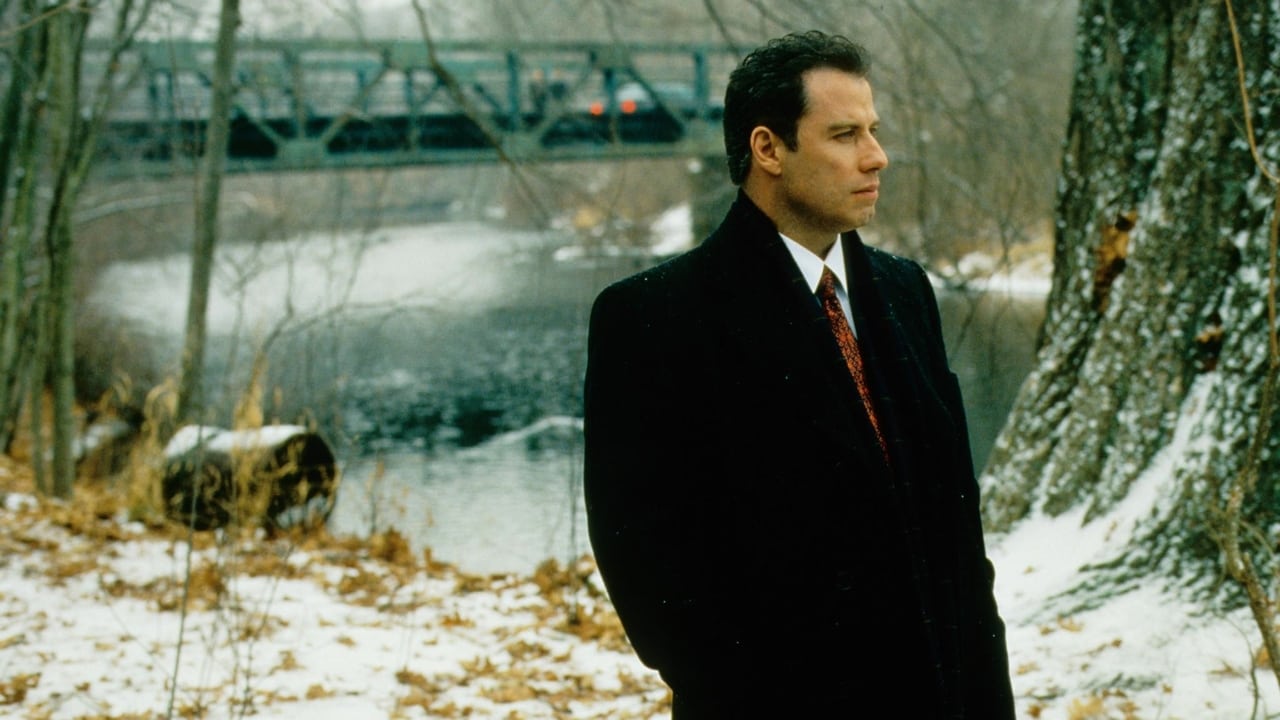secondtake
A Civil Action (1999)John Travolta holds this decent but routine film up pretty well, acting as the heroic and sacrificing lawyer for an environmental case in Massachusetts. The plot is restrained, not the heart-tugging Erin Brokovich kind of spin on the same idea, and it deserves some credit for taking the reality of it seriously, including the ending.The photography may not seem notable at first, but in fact there is a quiet stead restraint and beauty to the way the film is seen, as well. A few camera shots, moving around a sculpture, or through a room toward Travolta, are stunning once you realize the trickery going on (moving and zooming at the same time, but subtly). And Connie Hall (the cinematographer) talks about how he found a somber palette for the color that stays consistent all through.The director, Steven Zaillain, is more of a writer, though he has "Searching for Bobby Fischer" to his great credit. And I think the material and stellar actors involved here could have been twisted into a great, classic movie. But it doesn't make it. The pace and the intensity are sometimes just off. Even the scenes of desperation and anger in the law office have the feeling of imitation and of acting a little too hard. Look for small roles by Kathy Bates, Harry Dean Stanton, and James Gandolfini. And of course Robert Duvall as the "bad" guy, as well as John Lithgow as the judge. But mostly look for an under-appreciated John Travolta here. Well done.
mentalgirl12
First of all, if you want a rehash of the plot, go read another review. This is a great movie. It's not your typical courtroom drama, but more of a legal drama. And it's a bit more realistic than what we're used to on the screen (but only a little), and some don't feel comfortable with stories told like it was. (The reason I say 'a little' is because I used to work for lawyers and I can't see any of those guys going that far out on a limb for a case.) But this was a true story and the filmmakers really stuck to the truth. It doesn't have the usual courtroom scenes, yet it still depicts what a hellish, slippery slope (and costly one) it is to win justice for your client in the only venue permitted: a court of law. I don't believe there's ever been a film that's told this story quite this way before.I always wondered why our protagonist in the film (that's Jan) took the case in the first place. I always assumed it was forced on him, but don't know where that came from. (I'll probably have to look it up in the book since I don't own the movie.) If it was voluntary, he had to have seen dollar signs in it somewhere. But I don't know because Jan doesn't know. He doesn't even remember the case, let alone why he took it. He sure doesn't remember Anne Anderson when she calls him on the air of a radio show, and asks him why he doesn't return his client's phone calls, which makes him look, sound, and feel like a real jerk.And exactly when he realized Beatrice Foods was Granddaddy to a plethora of stuff that America consumes daily, that's fuzzy too. It's after he's been humiliated on the radio that we see he's got the file and talking to one of his partners about Beatrice Foods' deep pockets. And his partner (I think it was Macy) tells him that kind of case is just a "black hole" and he should get rid of it. So he goes out to Woburn to meet with the families for the first time (he's had the case 2 years!) supposedly to get rid of them. But after hearing their stories, he can't do it. He's too much of a coward. I also think he's embarrassed by their unbelievable loss and suffering; maybe he feels somewhat sorry for them. But I really believe that the increasing obsession he soon develops over securing the highest number he can for his clients isn't due to a sudden awakening of conscience, or a heart burgeoning with pity, which is what it looks like on the outside. But there's been no character change yet. His anger grows, but it has little to do with the crimes committed by the big corporations against his clients. What really jerks his chain more than anything at this point are those pompous defense attorneys; how they act and how they treat him makes him furious. He's consumed with beating them down and knocking them out of the game for good really because of hurt pride. Jan Schlictman is no hero. One reviewer aptly wrote that he had "feet of clay." He's a hot-shot. I wouldn't say he "loves the law;" I would say he loves having knowledge of the law which allows him to manipulate it, and that gives him power. He doesn't appear to respect the law. We see him getting a speeding ticket on the way to Woburn, and again — from the same cop — on the way back. As he takes the ticket and insolently slams it into his glove compartment that's just teeming with others, he resembles a rebellious teenager. And the filmmakers made sure to show us that early in the film.In my opinion, his character starts to change ― and here comes a spoiler ― the moment near the end when he picks up Grace's number off the floor. (That part always kills me!) His partners have read him the riot act and walked out on him. He's sitting on the floor, his body slumped over the phone as he picks it up and dials. His body language reflects utter despair. Note: To those who get bored when there's not enough action, and/or can't tell what's happening with a character because there's no dialog to explain, learn to read the actor's body language. If he or she is an above-average actor, (and you are somewhat intelligent), you should be able to get it.As for Oscar nominations, for once I can see why the Academy didn't nominate Travolta for his acting here. I compared this performance with Travolta's take on Tony Manero in "Saturday Night Fever," and again with Vincent Vega in "Pulp Fiction." For me, it just doesn't compare. He's not that skillful at the underplaying thing. Robert Duvall's nomination didn't surprise me.Having read the book, I thought the writers accomplished the ending fairly well, even if they omitted a heck of a lot from the book's ending. (It seems to me the families actually did get to testify, but I could be wrong.) There are too many movies that are dumb, pointless, predictable, and a waste of two hours, with too few being clever, absorbing, stimulating, and different. I can never pass this up whenever it's on. But it bores most of my friends, too— probably for the same reasons others have stated — no action, no high drama. Also, Travolta underplays his performance for the most part, (which allows Duvall all that scene-stealing) and I think that was an excellent decision for that role, whose ever it was. And whenever an actor does that, sometimes people don't get it; they think nothing's going on, that the star is holding back. Trust me, they did this one right.
Raul Faust
The first thing that I don't like in this movie is that it tries to pass a moral lesson. I don't enjoy that thing on movies, it seems like the filmmakers are saying he's better than the audience and knows more. Second reason, the film runs too slowly. When a movie is interesting, he captures your attention and things happen quickly, which is not the case here. Other than that, the film tries to reach it's climax, but unfortunately, fails. It's like nothing much really happens throughout the whole "mistery".The good thing in this movie is the acting. Many actors I've never heard about act better than many current Hollywood. Also, the subject is interesting and so would be the movie if better directed and written.
jDriftyx82
The case in Woburn, Massachusetts began with one woman's suspicions. Anne Anderson discovered her son, Jimmy, had leukemia in the summer of 1966. During the time Jimmy was being treated for leukemia, Anne began to talk to people in her neighborhood. She soon heard of two other cases of childhood leukemia only a street away from her. Anne began talking with one of the mothers, Joan Zona, because her son had leukemia as well and the two women became friends. They discussed the incidences of leukemia in their neighborhood and both agreed that it was a strange coincidence, but Anne became obsessed with the idea. She discovered several other cases of leukemia and began to analyze why this was happening. Anne started worrying about the water in Woburn, which had not tasted good since two wells, called G and H, were drilled and began pumping water into eastern Woburn in 1965. Complaints began pouring in to the city of Woburn regarding the quality of the water and the rusting of pipes, thus causing wells G and H to be shut down several times. However, the wells were not shut down for good until much later. Anne expressed her worries to her family doctor, her church minister, and her husband. Anne's husband and doctor listened to her suspicions, but did not believe they had any validity.Now, after reading the book, it became apparent to me that, the book was much more interesting and intriguing.



 AD
AD





